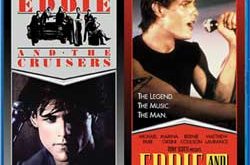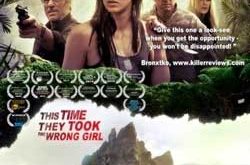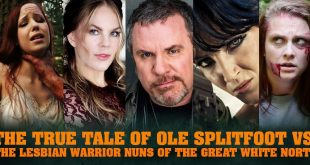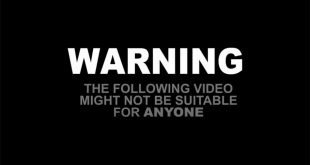Interview: Author david j. moore
(World Gone Wild: A Survivor’s Guide to Post-Apocalyptic Movies
The apocalypse is something all of us think about or fear in the back of our minds. A tough, desolate world where humanity is forced to survive when everything they’ve ever known is lost. Hundreds of films have explored what could possibly happen if the world were to essentially end and there’s one author brave enough to delve into all of the dark spaces of the world to find and collect all these movies into a single reference guide. This is his story and how he gave humanity a fighting chance by delivering us his massive and essential tome.
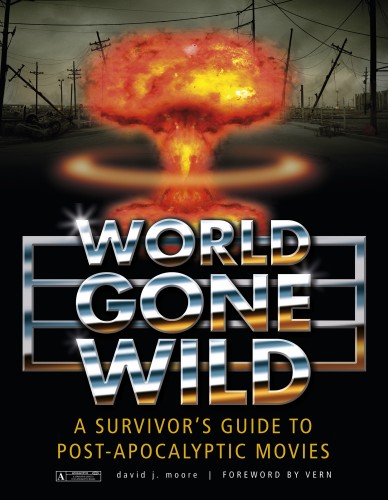
What was it that inspired you to write this book?
I’ve always been into end-of-the-world movies. I couldn’t put my finger on why until I saw three grungy post-apocalyptic movies on VHS in a row one night: Land of Doom, Exterminators of the Year 3000, and After the Fall of New York, which is also called 2019: After the Fall of New York. After that, my perspective on the genre somehow changed, and I was hungry to see more. I wanted to create a master list of post-apocalyptic movies and find them, watch them, and review them. I read a book called Apocalypse Movies by a guy named Kim Newman, and that book made me want to one-up him by devoting equal attention and detail to every movie in the genre. I wanted to study the big, and better known movies like The Road Warrior and Planet of the Apes, and have just as much room in the book for smaller, less discussed stuff as those three movies that started the whole thing for me. I’m a massive consumer of VHS, DVD’s, and Blu Ray’s, and having ultimate movie guides and reference books help me map out my journey through certain genres, and writing an end-all, be-all guide about post-apocalyptic movies was just something I felt like I had to do to get what I wanted.
What sort of process did you go through or guidelines did you set to determine which films should be included in this book?
It took me a while to figure this out. I knew I wanted to cover the entire spectrum of the genre, but I had to set some ground rules so I didn’t end up watching a ton of zombie movies or whatever that I really didn’t need to watch. I made it very clear early on in my mind that I would only include or review movies that showed a time and a place where a devastating apocalypse or cataclysm occurred in the running time in the movie. If the apocalypse had already happened before the movie started, that was usually easy enough to spot and identify, but some movies were tricky. Sometimes I’d wait for the entire length of the movie for the apocalypse to happen, and if it did, I’d include it. Sometimes, the movie would be set on a spaceship or something like that – or on another planet – and you’d gradually get information that the Earth was destroyed years ago. Basically, this process is what made the book so difficult to finish. I kept running into movies that aren’t what I’d consider to be post-apocalyptic. It took me years to get to the point where I felt I’d included the most movies I could that dealt with the apparent theme of the end of humanity. For instance, I didn’t include Armageddon because the damage to Earth wasn’t severe enough. They stopped the apocalypse from happening in that movie, but I did include Deep Impact because humanity suffers a great, irreparable loss in that one. I also included stuff like Star Trek: First Contact because it dealt with some overtly post-apocalyptic themes. All the movie had to say was that a nuclear war happened, or a virus decimated the population, and I would include it.
How would you try to sell this book to someone who is unfamiliar with the genre?
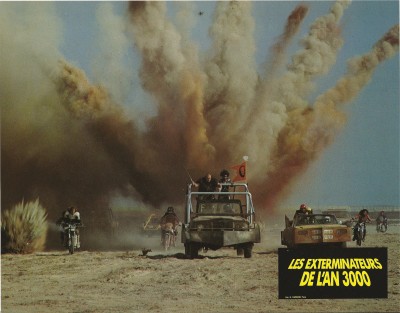
I don’t think this book is a tough sell. Everyone’s seen some movies that take place in a nuclear wasteland or in a post-apocalyptic environment. Some of the biggest movies out there are in my book. Who hasn’t seen – or at least heard of – Planet of the Apes, Mad Max, Waterworld, World War Z, I Am Legend, or even stuff like Pacific Rim or the newer Godzilla movies? Every couple of weeks there’s a new grand-scale apocalyptic blockbuster out there. When I saw Man of Steel, I was shocked and a little depressed to realize that I had to include it in the book. If anyone out there is even just halfway interested in movies in general, my book World Gone Wild should be interesting, if only because it covers the entire genre and all its nooks and crannies. Every time I see a new movie reference book that covers a genre I’m not entirely immersed in, I pick it up, and more often than not I’ll buy it and read it, taking notes so that I can be as close to an expert on that genre as possible. I’m a movie guy. I love movies, and these types of books are really helpful to me as a student of film. Anyone who’s coming from the same place should find this book essential. I don’t know. We’ll see how it goes.
Aside from the reviews and interviews, what else can we expect to see in the book?
Aw, man, I can’t wait for you to check out this massive subgenre index I did for the book. Early on, I had to lay every detail and subgenre out so that I knew what I was dealing with. I created a legend or a grid of subgenres and began making all these lists with headings like “Amazons and Sisterhoods,” “Bomb Shelters,” ” The Last People on or From Earth,” and “Warlords and Marauders.” As I watched all these movies, I would note which subgenre categories each movie dealt with, and eventually it became like a dictionary. That’s why the subheading for World Gone Wild is “A Survivor’s Guide to Post-Apocalyptic Movies.” In a way, I imagined that the book would help people survive after the apocalypse. If you read it and watch the movies I reviewed, you’ll sort of get an idea of how to survive through each scenario. I also gave each movie a rating, and I came up with a fun rating system that I think will go over well with everyone who reads it. This is a fun book. I want to make that clear. It’s not boring. It’s fun to look at and flip through, while still being a dedicated reference book that takes the genre seriously.
Over 800 films is a dizzying amount for one person to go through. How long did it take you to complete?
Eight years, man. Eight years ago, I wrote the first review for Circuitry Man, and back then I didn’t have a computer. The first two hundred reviews I wrote on a typewriter! When my typewriter finally gave up the ghost, I desperately tried to find a place that could fix it and give me enough ink to last me for the next few years, but my wife convinced me to finally break down and get a computer. I can’t imagine the pain and suffering I would have had to go through if I’d continued writing this thing on a typewriter. The book just kept expanding, and the biggest challenge was finding hard copies of all these movies to watch. I’ve never downloaded or streamed or Netflixed a movie in my life, and I’ve never even rented a movie as an adult. Every single movie I watch at home, I’ve bought myself by either finding it out there in physical form or by finding physical copies online via sites like Amazon, Ebay, or other sellers from around the world. So, yeah, it was tough to find really obscure titles. I had a little network of helpers all over the globe, helping me locate the tough ones. Some stuff was nearly impossible to find. I actually watched two things on YouTube, and I think one or two shows live on television.
Tell us about the people you were able to interview for the book. Who can we expect to see in there?
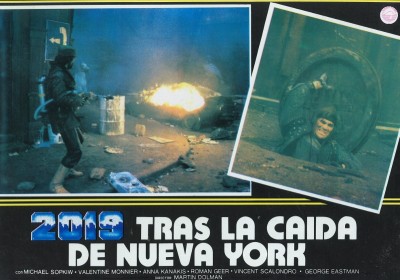
It didn’t quite occur to me to interview anybody for the book until one day I sort of stumbled into film journalism. All of a sudden, I was writing articles for movie magazines, and interviewing actors and directors was just something that came naturally to me. I set a goal to start tracking some cool filmmakers down – guys like Albert Pyun and Stuart Gordon – and when I got that going, I knew that my book was going to be something really special because I respect these guys and I love their work. They all had interesting things to say about the post-apocalyptic genre, and in some cases, their apocalyptic films don’t get the sort of coverage that I think they deserve. In addition to Pyun and Gordon, I interviewed big names in the genre like Paul W.S. Anderson, Neil Marshall, Martin Campbell, and Steve DeJarnatt, all who’d done landmark movies in the genre as far as I’m concerned, and I also went after guys whose movies nobody ever talks about. That was the best part of the whole endeavor for me, was interviewing these people. I also interviewed a bunch of actors who’d made movies in the genre, like Fred Williamson, Roddy Piper, Vernon Wells, and Michael Pare. It’s a book bursting with content, I promise!
Who gave the most interesting interview?
Honestly, they’re all really interesting for different reasons. At the end of each interview, I asked each person the same question, which was “If the world were to end as it does in the movie you made, do you think you’d make it as a survivor?” Everybody had a radically different response. Some people told me that yes, they’d survive if they would be able to get their family together and fortify a grocery store, and others told me that they’d likely not survive if they had no one else to fight or live for. Every response told me a little bit about that person, and it made me realize that this study was really open-ended and diverse. I appreciated that each person was willing to role-play with me a little bit during the interview process.
Aside from the obvious films like the Mad Max trilogy, Escape from New York, and the more commercial films, were there any surprise treasures, films you had never heard of that turned out to be amazing?
Oh, yeah, definitely. I’ve already mentioned 2019: After the Fall of New York, but that was the jewel in the haystack, easy. I found some great movies that I’d had low expectations going in. It was better for me to just dive in when it came to watching all these movies and just “study” them instead of hoping to be entertained. In the study, I think I was able to be pleasantly surprised by stuff if I just let my guard down because by the end of the whole process of watching all these movies, I was becoming a little depressed by the subject matter. It was great to find something like Pontypool or Deathlands: Homeward Bound or smaller films like Bleak Future and Black Pearl that would just blindside me with how cool they were. I had zero expectations with these movies and ended up being really entertained, challenged, and amazed at how well they represented the genre while also just being really badass.
What was the most bizarre or outlandish film you found? Weren’t there some P*rnographic post-apocalyptic films out there that you came across?
Oh gosh, yes, there were quite a few bizarre movies I came across, and yes, there were a handful of adult films that I reviewed that had overt apocalyptic themes running through them that I felt warranted discussion. There was a film from Brazil, I think, called Wild Sex of the Children of the Night, which I’m still bewildered how I came across. That was truly one of the strangest movies I watched for this book. It had a completely bonkers story about these nomadic gangs that had overtaken this city in Brazil some time after the apocalypse and they were all dressed like kids who had raided a costume shop, and the Amazon women went around raping men in the subways, causing ruckuses throughout the movie. The fight scenes between these foofy looking weirdoes consisted of pushing and shoving, and throughout the whole thing there were these hardcore P*rn segments sprinkled in, which just didn’t make the movie any better. But, yeah, I included a handful of P*rn films like Rinse Dream’s Cafe Flesh and the sequels to that, as well as more notable adult films like The 8th Day and the parody movies like The Load Warrior and Beyond Thunderbone. I thought very carefully before venturing into this territory, and I ultimately decided that every facet of film should be included in this study, and because of that rationale I also covered as many Evangelical rapture movies as I could find, as well as anime movies and series’, and short films too. Once I made a commitment to these areas, I was able to feel comfortable that I was covering all of my bases equally. As a result, I ended up watching some pretty bizarre stuff.
How did you decide on the title of your book?
The title came early on. I’d been aware of the movie with Bruce Dern and Michael Pare, but I don’t think I blatantly stole the title. It was a title that just summed up what I was going for. It was a perfect fit.
What sort of expectations do you have for the book when it’s released?
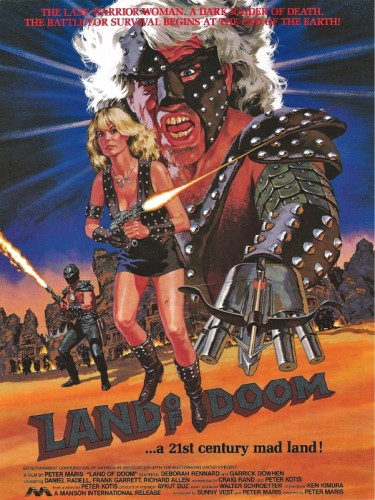
I hope it finds its audience. When I was writing it, I was essentially writing it because it was something I’d really wanted to see on my own shelf of reference books, and I’m really happy with the way it’s turned out. It’s exactly what I wanted, and because I’m pleased with it, I know that it will make a lot of other people out there happy too. I’m hoping that everyone who’s already preordered it and who’s looking forward to buying it online or in retail stores when it’s been released will feel its heft and flip through its pages and see that it’s the real deal. I look forward to hearing feedback of all kinds so that I can kind of gauge how to better please the same consumers for my next book.
Didn’t you at one time try directing your own post-apocalyptic film? Whatever happened with that?
Haha! Yes, it’s true. Once upon a time I wrote a 60-page script for a silly post-apocalyptic movie, and I managed to drag about 20 friends on an arduous quest to make it into a movie. We caravanned tons of equipment up into Azusa Canyon and to the deserts of Palm Springs to make this thing, and after several excruciating days of filming in the heat of summer and making my friends miserable, I called it quits. Some years later, I wrote a pretty cool full-length script that took a fresh take on the apocalyptic genre, but I haven’t done anything with that since. I keep thinking it will make a great novel. I may return to that some day. I’ll say this, though: After watching over 800 movies in the genre, I’ve never seen an end-of-the-world movie like the one I wrote. It would make a great movie.
What are your plans for future projects once the World Gone Wild journey is complete?
I’m almost finished with my second book The Good, the Tough, and the Deadly: Action Stars and Their Movies. It’s going to be even bigger and better than World Gone Wild. It covers movies starring men and women who’ve crossed over from the world of martial arts, sports, bodybuilding, and stunt work and have made action films exclusively. I’ve been reviewing hundreds upon hundreds of movies for this project and I’ve been doing some great interviews with these action stars – people like Michael Dudikoff, Mark Dacascos, Scott Adkins, Cynthia Rothrock, and Don “The Dragon” Wilson. I’ve also got a guest list of writers contributing reviews for this book – people like Zack Carlson and Vern, to name a few. It’s going to be fantastic.
Speaking of Vern, how did he become involved with the writing of the forward to World Gone Wild?
Yeah, good question. Years ago, I found Vern’s book Seagalogy and I couldn’t believe that someone out there was as interested in Steven Seagal’s movies as I was. This guy literally made a study about Seagal’s movies, which I thought was brilliant. It’s exactly the sort of thing I would have done eventually if he hadn’t already done it, only I think I would have covered Van Damme’s movies instead! But the fact that Vern had the audacity to do something like that made me want to befriend him or get him on my team, so to speak. I contacted him after I’d finished World Gone Wild and pitched him my book with the hope that he’d understand what I was doing and be willing to sort of bring his voice to the opening of the book. I wanted his blessing because I respect him as a writer. If Vern approved, then I was set to offer the whole thing to the world.
Is there anything else you would like to add about the book or your experience writing it?
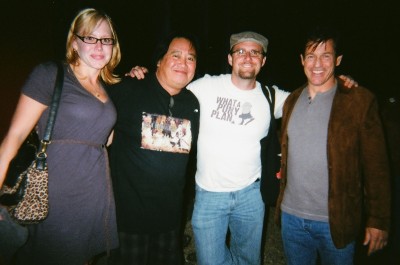
By the end of it, I felt like I’d gone through the wringer. I don’t know who else out there has seen more than 800 post-apocalyptic movies, but I have and my spirit was getting a little tainted and marred by all of the hopelessness and despair I saw throughout the years. It was all make believe, but anyone who’s seen movies like The Day After, Threads, When the Wind Blows, and The Road knows that some of these movies aren’t messing around. Movies like these are made as warnings to mankind that if we’re brought to our lowest state, that we should never lose the essence that makes us human. Hope is essential and it’s vital that we cling to it and be a race of believers and practitioners of love, hope, and faith. Seriously. If we lose our humanity, these movies are saying, then the world ends. I’m just happy to have survived that journey. I still hope and believe. If the world were to end as it does in any of these movies I watched, I will survive and lead anyone who is willing to follow me into a future full of hope. I’m an optimist. I will live to see the next day.
A special thanks to david for taking the time out to talk to me and you can just click here to head on over to Amazon and pre-order your very own copy of what I’m sure will be essential reading for the film buff.
 Horror News | HNN Official Site | Horror Movies,Trailers, Reviews
Horror News | HNN Official Site | Horror Movies,Trailers, Reviews

